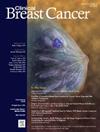激素受体阳性,HER2阴性乳腺癌新辅助化疗的当前文献和实际结果综述。
IF 2.9
3区 医学
Q2 ONCOLOGY
引用次数: 0
摘要
背景:新辅助化疗一直被用于局部晚期ER+/HER2-乳腺癌的降期治疗,但反应率较低。该人群的最佳新辅助治疗方案尚不清楚:2017年至2022年间,我院对192名II/III期ER+/HER2-乳腺癌患者(28-78岁)进行了评估。根据所使用的新辅助化疗方案(AC-T、TC、TAC 或其他)将患者分为 4 组。反应分为完全反应(ypT0/is ypN0)、部分反应、无反应或疾病进展:结果:选择新辅助化疗并不能预测 pCR(P = .3864),即使在结节病较晚的患者中也是如此。AC-T组和TC组在24或48个月的OS或IDFS方面无明显差异。在 AC-T 组(n = 130)中,9 名患者获得了 CR(6.98%),而 TC 组中没有患者获得 CR。与绝经后的患者相比,绝经前的患者更有可能获得 pCR。种族对IDFS有明显影响:在这项单中心研究中,我们发现新辅助TC与AC-T的IDFS和OS没有差异。AC-T 方案组的 pCR 率为 6.98%,高于 TC 方案组的 0%。要了解非白人群体的IDFS较差的原因,还需要进一步的探索。本文章由计算机程序翻译,如有差异,请以英文原文为准。
A Review of Current Literature and Real-World Outcomes With Neoadjuvant Chemotherapy in Hormone Receptor Positive, HER2 Negative Breast Cancer
Background
Neoadjuvant chemotherapy has been used to downstage locally advanced ER+/HER2- breast cancer with low response rates. The optimal neoadjuvant regimen for this population is unknown.
Patients and Methods
Between 2017 and 2022, 192 patients (ages 28-78) with stage II/III ER+/Her2- breast cancer at our institution were evaluated. Patients were divided into 4 groups based on the neoadjuvant chemotherapy regimen used (AC-T, TC, TAC, or other). The responses were categorized as complete (ypT0/is ypN0), partial, no response, or progressive disease.
Results
The choice of neoadjuvant chemotherapy was not predictive of pCR (P = .3864), even among those with more advanced nodal disease. No significant difference was noted in OS or IDFS at 24 or 48 months between the AC-T and TC groups. In the AC-T group (n = 130), 9 patients had a CR (6.98%), while no patients in TC group had a CR. Those who were premenopausal were more likely to achieve pCR compared to those postmenopausal. Race significantly impacted IDFS.
Conclusions
In this single center study, we found no differences in IDFS or OS when comparing neoadjuvant TC to AC-T. The AC-T regimen group had a higher pCR rate of 6.98% compared to 0% in TC regimen group. Further exploration is needed to understand why non-white populations have inferior IDFS.
求助全文
通过发布文献求助,成功后即可免费获取论文全文。
去求助
来源期刊

Clinical breast cancer
医学-肿瘤学
CiteScore
5.40
自引率
3.20%
发文量
174
审稿时长
48 days
期刊介绍:
Clinical Breast Cancer is a peer-reviewed bimonthly journal that publishes original articles describing various aspects of clinical and translational research of breast cancer. Clinical Breast Cancer is devoted to articles on detection, diagnosis, prevention, and treatment of breast cancer. The main emphasis is on recent scientific developments in all areas related to breast cancer. Specific areas of interest include clinical research reports from various therapeutic modalities, cancer genetics, drug sensitivity and resistance, novel imaging, tumor genomics, biomarkers, and chemoprevention strategies.
 求助内容:
求助内容: 应助结果提醒方式:
应助结果提醒方式:


